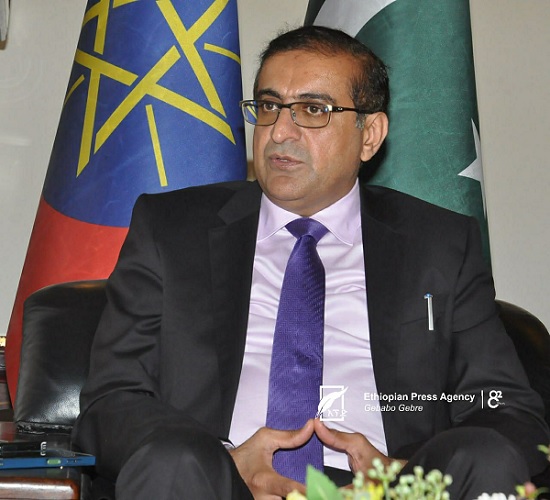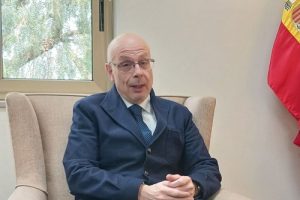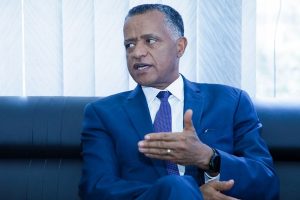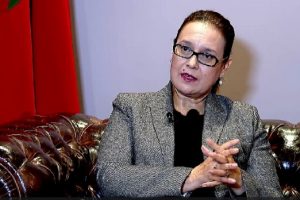
Today’s Herald Guest is Atif Sharif, Ambassador of Pakistan to Ethiopia as well as the African Union and South Sudan. I mean officer of the Foreign Service of Pakistan. I served before coming to Ethiopia in Malaysia, Ankara, and the Netherlands. It has been almost a year since he took up his assignment as an Ambassador of his country here in Ethiopia. The Ethiopian Press Agency has approached him recently to discuss the bilateral ties of the two countries and his observation of current economic, trade and investment development here in Ethiopia. Enjoy reading!
How do you see the homegrown economic reform in the city?
Ethiopia had been generally a socialist country socialist economy in 1973 when the Derg regime introduced a very strong kind of socialist government and communist economic system. Under Prime Minister, Meles Zenawi the country made very good economic progress, but that too was more a state-controlled economy. The state was the main Engine of the growth and the driving force. But, many parts of the world have gone towards a Liberal economy, where the private sector would play the role where the government would just be the regulator and would have a minimum role.
These issues were addressed by the government of Prime Minister Abiy Ahmed because in modern days you have to allow your private sector and your economy to function, in a balanced manner. For example, this homegrown economic reforms your exports were not growing that much. Imports are 4 times more than exports last year. You had 17 billion dollars in Imports and 3.4 billion dollars in exports, so it’s like 4 times more. So one of the biggest problems was that foreign exchange was artificially fixed.
In my country and many other parts of the world, the foreign exchange rate is the result of demand and Supply. If there’s more demand for dollars and there’s less Supply, it means your currency has to depreciate and the dollar has to appreciate. This way it becomes an equilibrium or a balance. So that way your exports are encouraged even Imports are discouraged. But when you keep it low at a low rate, then, it discourages exports, and it encourages Imports. And then, the foreign investors also do not feel very happy about it. So I think it was a very right decision.
Through the reform, the country is letting the private sector; natural demand and Supply determine the exchange rate. For example, now, the government has allowed foreign investment in the banking sector. You have allowed foreign investment in the retail sector in the wholesale sector. You have allowed the foreign investors to operate in the Commodities export sector. No economy in the world can stay as a closed economy or based on a government-led economy. Even countries considered socialist countries have moved towards more liberalized economies and market-driven, Market-based exchange rates. In my country, we have adopted very similar economic reforms.
Our exchange rate has been based on the Market-based exchange rate. So it depreciated about 100% 2 years ago. But now it has been stable for 1 year. So that is the way to go forward. In the short term and I understand people are going to raise prices and inflation will be High, there will be an effect on Some people, but I think gradually things will adjust. And your government is trying to support the poor people trying to caution them from this big impact. I believe that is the way forward.
You have to privatize many of your big companies. For example, if you want to make a big airport or a big road the government doesn’t have to invest [but allows] Public-private investment which is called PPI. Through Public public-private investment model Turkiye has adopted where the new Istanbul airport was built on that model. Pakistan also is adopting so many road projects and public-private investment models, where the government is just paying 10%. Maybe the private sector is paying 70% and then they will do it. And lot of Industries are already privatized, banking sector Insurance sector electric, and tele-communication. Because of that, the quality has improved. There’s so much competition, that prices have come down. New investment has come into the country. So I think this is promising for Ethiopia. And I hope that in a few years, it will give you very good results.
How do you assess the Incentives to encourage Pakistani investors to invest here?
We had 2 large delegations from Pakistan in the last 2 years. In May 2024 about 70 Pakistani companies and their owners came to Ethiopia. In 2023 similar number of investors came to Ethiopia. And they all and I also interacted with them, in 2024 and I think there are a lot of incentives being offered by your government. Like the electric utility prices are very reasonable. Electricity is pretty cheap in Ethiopia. Then you can get the Industrial parks, you can get land in the industrial parks; procedures to set up an industry are simple. there are incentives. There’s a duty-free import so you can do, the duty-free import. Then there’s an exemption from taxation for 5, 10 years, that’s also a good incentive.
So I think there are enough incentives. Now, the only thing that we need to focus on is that people need to understand the market. People need to understand it to get the confidence and then take this in. After these foreign exchange reforms, it will be easier for foreign investors to repatriate their money. There will be no difference between the official exchange rate and the parallel market so they can take their profit back easily. In this area, there will be more comfort for the foreign investors. I feel that now the incentives are pretty good, and we are hoping that the people will come from Pakistan also, and do some investment. By the way, 3 chambers of Pakistan have already signed a MoU with the Ethiopian Investment Commission and they’re going to set up industry in Ethiopia.
How is the trade balance going between the two countries?
Our total trade balance is like 50 to 60 million dollars. It keeps fluctuating, sometimes it’s 70 million dollars, a little less, or more. We are exporting about 40 to 50 million dollars to Ethiopia. I think 20 to 30 million dollars are the cereals and within cereals, there are different kinds of Rice. Our rice is also used in, uh, preparing injera. But Pakistani rice goes well with injera. Then we are exporting, textile raw materials.
Some of the textiles are ready-made things like shirts. Pakistan produces very good quality readymade Textiles. So they are also being exported. Chemicals are also being exported. We have a big chemical industry, they are also being exported. Machinery and steel are also coming.
We have surgical equipment. You know these kinds of precision things for they use it in surgery, the dentists are using it. So surgical things are also coming. 10 to 15 million dollars is exported from Ethiopia to Pakistan. And we are importing, agricultural things, for example, oil seeds, Lentils, red kidney beans … etc.
Pakistan generally is not a very heavy consumer of coffee. But the trend is shifting. Now the Young Generation because of the global impact, they’re moving towards coffee and we are also importing coffee from Ethiopia. And I have gifted Ethiopian coffee to many of my friends and they all like its flavour and all those things. So I’m sure it’s going to increase more.
How do you think can the two countries further enhance their relations?
Ethiopia is strong in the aviation sector. There’s a good opportunity to increase Ethiopian Airlines flights to different parts of Pakistan. This can create more linkages between the 2 countries and the businessmen. Already there are 4 flights to Karachi. Ethiopian Airlines is interested in increasing the number of flights from Lahore to Islamabad. So this is one area.
Tourism is also one area where both countries have good opportunities. Pakistan, for example, has mountains glaciers and snow. Pakistan also has very beautiful beaches and very good hospitals. Pakistan has the best dental treatment, heart surgery treatment, kidney treatment, cancer treatment, and liver treatment; even liver transplants can be done.
People are very good in the Services sector so we can train Ethiopian technicians. For instance, a Pakistani engineering company came here and they’re going to set up a workshop for the repair of Transformers. So These kinds of technology and technical things we can share with Ethiopia and Ethiopian businessmen also, there is a Demand for Pakistani specialist doctors like orthopaedic gynaecologist in Ethiopia. We continue to offer scholarships to our brothers and sisters in Africa As well as in Ethiopia last year.
We can provide scholarships in Engineering, Medicals, and Health Sciences, teaching in different areas, and banking (Finance). This year the University of Health Sciences started a new program in Pharmaceuticals, i.e. 4 four-year program in Pharmacy. And we offered scholarships to the government of Ethiopia.
Education and scholarship are good things and I’m trying to meet the Ministry of Education to sign an MoU where we can have more structural cooperation because sometimes scholarships are there but people do not respond and they go wasted because, For example, we do not know the right people in Ethiopia. And I tell you that many of the professionals have studied in Pakistan and they’re doing very good jobs over here, they’re very good because we have a very high quality of Education. But Within the Global South, our people have good skills,
And then in pharmaceutical, we have this education. 70% of medicine is produced in Pakistan. So we are almost self-sufficient in our pharmaceutical industry. So that’s why, if your people get trained in pharmaceuticals over there, they can come back and start their industry. I invited a close friend of mine, the president of a leading pharmaceutical company. He came to Ethiopia, on my invitation and he met with the investment commissioner, Hana Arayasellasie. He met with her and some pharmaceutical companies also and they have a proposal for a joint venture in Ethiopia, where they can give the technology and the human resources and some investment, and then the rest will be, joined by investors.
How do you see the role of Ethiopia in the Horn of Africa region?
I think Ethiopia is the kind of the leading country in the East Africa region and the Horn of Africa region. It is also the most prominent, African country in the Horn of Africa. It hosts the headquarters of the African Union. So one of the emperors Hailesellasie was one of the founding members of the African Union. Under his leadership, Ethiopia played a big role in liberating, other African countries, and supporting other African countries against colonialism. So I think it has a good Very respectable history in this regard. And currently, also, I think you are the leading country in the IGAD.
Under the few forums, I think it’s playing an important role in connecting the IGAD, African Union, AfCFTA its trade, Market and regional initiatives. You’ve rightly pointed to connecting the grid with other Regional countries like Kenya; you’re planning to export more to Kenya Djibouti Sudan and South Sudan. And I think what’s important is to also have a strong Road Network connecting with like the Lamu port, with the South Sudan, with the Kenya through the LaPSSET. And that’s my promise also and also you’re connected with Djibouti with good roads and in the rail network.
There are other areas also which are being explored. So I think Ethiopia has the capital, it has the know-how, and it has the demand. If you take the initiative, other countries will go along with it and it will become easier. In my view connecting strong Road networks is important, for regional integration. Regional trade is very important also. You also are diversifying your ports so that will be good for the regional integration as well.
Ethiopia is undertaking a green development initiative under the annual Green Legacy Seedling transplantation campaign. What do you think would be the overall importance of this initiative?
It is a very laudable project. It’s an achievement, a unique achievement of the Ethiopian government because no country in the world has funded so many trees. Ethiopia like Pakistan is highly vulnerable to climate change and disasters. There is an irregular pattern of rain in the country. Sometimes there is drought sometimes floods and food security is impacted. So hopefully with this green initiative billion plus trees have been planted. It’s a big number. It’s very encouraging. Your Forest cover will increase. Food Security will increase and the climate impact will be minimized; so I think it’s a good model for other countries. Pakistan is also following this model. The numbers are much bigger in Ethiopia, so I think, definitely Prime Minister Ahmed, has done a wonderful leadership role in this thing.
How do you see the future of the 2 countries?
We are at the beginning of our bilateral relationship, its initial phase. We need to work hard, we need to connect, and I see a lot of enthusiasm in Pakistan for relations with Ethiopia. Your Ambassador daily meets with every Minister and all the doors are open for him. In Ethiopia, we have to look for that kind of opportunity and we are hoping we’ll have a similar response as being extended to your Ambassador in Pakistan. But definitely, it requires a commitment by both countries to move forward. There are so many areas in which we can cooperate in the education sector healthcare sector, tourism sector, Industry, Social, in economic reforms. There’s a lot to learn from each other and a lot to gain from each other.
Thank you very much for your kind collaboration!
You’re most welcome!
BY SAMARAI KAHSAY
THE ETHIOPIAN HERALD SATURDAY 31 AUGUST 2024





